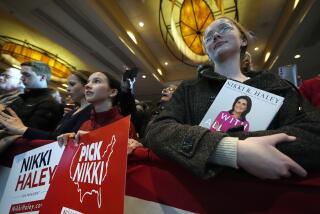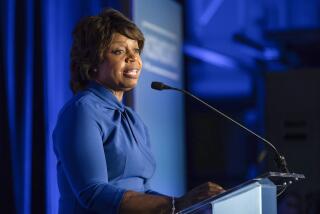N. Carolina Tough Going for Buchanan : Election: Conservative’s campaign runs up against strong Republican loyalty to Bush. And Jesse Helms, ideological soul mate, backs the President.
- Share via
RALEIGH, N.C. — When Republican rebel Patrick J. Buchanan decided to spend eight days campaigning in North Carolina in advance of the state’s presidential primary Tuesday, he had high hopes of a good showing, as well as a long-shot chance for an upset.
Although President Bush has now won enough national convention delegates to clinch the 1992 Republican nomination, Buchanan is angling for long-term conservative support that would lay the groundwork for a future run. North Carolina seemed fertile ground for this goal.
The state’s Republican senator, Jesse Helms, is an ideological soul mate who consistently wins reelection. North Carolina’s church-centered cultural conservatism seemed an ideal climate for Buchanan’s emphasis on religion and old-fashioned virtues. And back in 1976, Ronald Reagan was able to revive his flagging campaign against President Gerald R. Ford with a victory in North Carolina. Reagan still lost the nomination that year, but his effort sowed the seeds of his White House triumph four years later.
But as Buchanan has sadly discovered on his lonely and little-noticed trek across the state, the Tar Heel state is difficult territory for him. Republicans here are loyal to Bush, despite voter unrest elsewhere.
So, barring an eleventh-hour turnabout, Buchanan has virtually no chance of approaching his personal high-water mark--the 37% of the vote he received in the New Hampshire and Georgia primaries earlier this year. In fact, some observers think his share will be embarrassingly low.
A recent poll by Durham television station WTVD indicated that the President was favored by 78% of the voters, while Buchanan polled a paltry 17%. Only 5% were undecided.
“The key variable was Jesse Helms, and he came out as co-chairman of the Bush campaign,” said Thad Beyle, professor of political science at the University of North Carolina at Chapel Hill. “Whatever Buchanan gets here will be the normal frustration vote--20% or 25%.”
Walter De Vries, director of the Institute for Political Leadership based in Wilmington, N.C., agreed. “Republicans in the state are fairly party-oriented and (Buchanan) probably will get a rather small percentage of the vote,” DeVries said.
There are hard-core Buchanan loyalists, such as Paul Newton, a self-described conservative Christian who claimed that he alone had made 2,500 phone calls to help his candidate.
But Newton is not a registered Republican, so he cannot cast a ballot for his choice. North Carolina prohibits crossover voting in primaries or participation by independents such as Newton.
This is not to say that all is well in the state for Bush. His disapproval rating was measured at 37% and his approval rating plummeted to 43% in a poll taken in February by the University of North Carolina journalism school.
Many protest voters apparently have lined up behind Ross Perot, the Texas billionaire who is contemplating an independent race for President. Perot finished in a dead heat with Arkansas Gov. Bill Clinton in the WTVD poll. Both were well behind the President.
Buchanan acknowledges that North Carolina is proving to be “one of the toughest states” for him, in part because it is relatively prosperous, and therefore public discontent with the Bush Administration is at a low level.
“It’s hard to think of any burning issue,” he complained on the first day of his North Carolina visit. “They are really doing quite well.”
Terming the state’s Republican Party more oriented to the GOP Establishment of Bush and former President Richard M. Nixon than himself, Buchanan added, “We start from a low base.”
In addition, the fact that Bush has clinched the Republican nomination, while his right-wing opponent has yet to win a primary has given many voters the idea that there is nothing to gain by supporting a challenge at this point.
Buchanan’s schedule--which has been heavy with trips to small-town newspaper offices and radio interviews--indicates that his North Carolina effort is running on a low budget. He has bought no television ads, but is relying instead on radio commercials attacking both Demcorats and Republicans in Washington as a “one-party Establishment” working against the interests of ordinary citizens.
At times, it seems he is using North Carolina to warm up for his campaign for the California primary June 2, where he is hoping a split in the state Republican Party will guarantee him a warmer reception.
More to Read
Get the L.A. Times Politics newsletter
Deeply reported insights into legislation, politics and policy from Sacramento, Washington and beyond. In your inbox twice per week.
You may occasionally receive promotional content from the Los Angeles Times.










